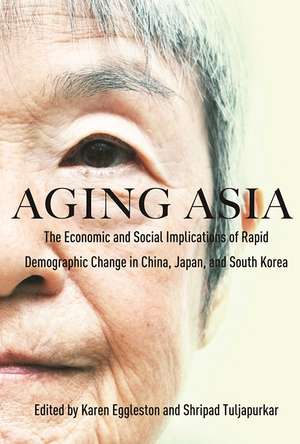Aging Asia: The Economic and Social Implications of Rapid Demographic Change in China, Japan, and South Korea
Editat de Karen Eggleston, Shripad Tuljapurkaren Limba Engleză Paperback – 24 ian 2011
In the past fifty years, two factors have led to global population aging: a decline in fertility to levels close to—or even below—replacement and a decline in mortality that has increased world average life expectancy by nearly 67 percent. As the population skews toward fewer young people and more elderly who live longer postretirement lives, demographic changes—labor force participation, savings, economic growth, living arrangements, marriage markets, and social policy—are transforming society in fundamental, irreversible ways. Nowhere are these effects of aging and demographic change more acute—nor their long-term effects more potentially significant—than in the Asia-Pacific region. How will these developments impact the economies and social protection systems of Japan, South Korea, China, and, by extension, the United States?
To assess this question, Aging Asia showcases cutting-edge, policy-relevant research. The first section focuses on demographic trends and their economic implications; the second section approaches select topics from a global comparative perspective, including social insurance financing, medical costs, and long-term care.
To assess this question, Aging Asia showcases cutting-edge, policy-relevant research. The first section focuses on demographic trends and their economic implications; the second section approaches select topics from a global comparative perspective, including social insurance financing, medical costs, and long-term care.
Preț: 194.45 lei
Preț vechi: 205.47 lei
-5% Nou
Puncte Express: 292
Preț estimativ în valută:
37.21€ • 40.41$ • 31.26£
37.21€ • 40.41$ • 31.26£
Carte indisponibilă temporar
Doresc să fiu notificat când acest titlu va fi disponibil:
Se trimite...
Preluare comenzi: 021 569.72.76
Specificații
ISBN-13: 9781931368209
ISBN-10: 1931368201
Pagini: 360
Dimensiuni: 152 x 229 x 15 mm
Greutate: 0.3 kg
Editura: Brookings Institution Press
Colecția Shorenstein Asia-Pacific Research Center
ISBN-10: 1931368201
Pagini: 360
Dimensiuni: 152 x 229 x 15 mm
Greutate: 0.3 kg
Editura: Brookings Institution Press
Colecția Shorenstein Asia-Pacific Research Center
Notă biografică
Karen Eggleston is the director of the Asia Health Policy Program (AHPP) at Shorenstein APARC, Stanford University.
Shripad Tuljapurkar is professor of biology and the Dean & Virginia Morrison Professor of Population Studies at Stanford University. He also directs demographic programs at Stanford's Center for the Demography, Economics and Health of Aging, and the Stanford Center for Population Research in the Institute for Research in the Social Sciences.
Shripad Tuljapurkar is professor of biology and the Dean & Virginia Morrison Professor of Population Studies at Stanford University. He also directs demographic programs at Stanford's Center for the Demography, Economics and Health of Aging, and the Stanford Center for Population Research in the Institute for Research in the Social Sciences.
Descriere
In the past fifty years, two factors have led to global population aging: a decline in fertility to levels close to—or even below—replacement and a decline in mortality that has increased world average life expectancy by nearly 67 percent. As the population skews toward fewer young people and more elderly who live longer postretirement lives, demographic changes—labor force participation, savings, economic growth, living arrangements, marriage markets, and social policy—are transforming society in fundamental, irreversible ways. Nowhere are these effects of aging and demographic change more acute—nor their long-term effects more potentially significant—than in the Asia-Pacific region. How will these developments impact the economies and social protection systems of Japan, South Korea, China, and, by extension, the United States?
To assess this question, Aging Asia showcases cutting-edge, policy-relevant research. The first section focuses on demographic trends and their economic implications; the second section approaches select topics from a global comparative perspective, including social insurance financing, medical costs, and long-term care.
To assess this question, Aging Asia showcases cutting-edge, policy-relevant research. The first section focuses on demographic trends and their economic implications; the second section approaches select topics from a global comparative perspective, including social insurance financing, medical costs, and long-term care.
